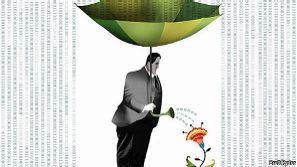Businesses, governments and society are only starting to tap its vast potential
Feb 25th 2010 | From The Economist print edition
 EIGHTEEN months ago, Li & Fung, a firm that manages supply chains for retailers, saw 100 gigabytes of information flow through its network each day. Now the amount has increased tenfold. During 2009, American drone aircraft flying over Iraq and Afghanistan sent back around 24 years' worth of video footage. New models being deployed this year will produce ten times as many data streams as their predecessors, and those in 2011 will produce 30 times as many.
EIGHTEEN months ago, Li & Fung, a firm that manages supply chains for retailers, saw 100 gigabytes of information flow through its network each day. Now the amount has increased tenfold. During 2009, American drone aircraft flying over Iraq and Afghanistan sent back around 24 years' worth of video footage. New models being deployed this year will produce ten times as many data streams as their predecessors, and those in 2011 will produce 30 times as many.
Everywhere you look, the quantity of information in the world is soaring. According to one estimate, mankind created 150 exabytes (billion gigabytes) of data in 2005. This year, it will create 1,200 exabytes. Merely keeping up with this flood, and storing the bits that might be useful, is difficult enough. Analysing it, to spot patterns and extract useful information, is harder still. Even so, the data deluge is already starting to transform business, government, science and everyday life (see our special report in this issue). It has great potential for good - as long as consumers, companies and governments make the right choices about when to restrict the flow of data, and when to encourage it.
Plucking the diamond from the waste
A few industries have led the way in their ability to gather and exploit data. Credit-card companies monitor every purchase and can identify fraudulent ones with a high degree of accuracy, using rules derived by crunching through billions of transactions. Stolen credit cards are more likely to be used to buy hard liquor than wine, for example, because it is easier to fence. Insurance firms are also good at combining clues to spot suspicious claims: fraudulent claims are more likely to be made on a Monday than a Tuesday, since policyholders who stage accidents tend to assemble friends as false witnesses over the weekend. By combining many such rules, it is possible to work out which cards are likeliest to have been stolen, and which claims are dodgy.
Mobile-phone operators, meanwhile, analyse subscribers' calling patterns to determine, for example, whether most of their frequent contacts are on a rival network. If that rival network is offering an attractive promotion that might cause the subscriber to defect, he or she can then be offered an incentive to stay. Older industries crunch data with just as much enthusiasm as new ones these days. Retailers, offline as well as online, are masters of data mining (or "business intelligence", as it is now known). By analysing "basket data", supermarkets can tailor promotions to particular customers' preferences. The oil industry uses supercomputers to trawl seismic data before drilling wells. And astronomers are just as likely to point a software query-tool at a digital sky survey as to point a telescope at the stars.
Read more.
